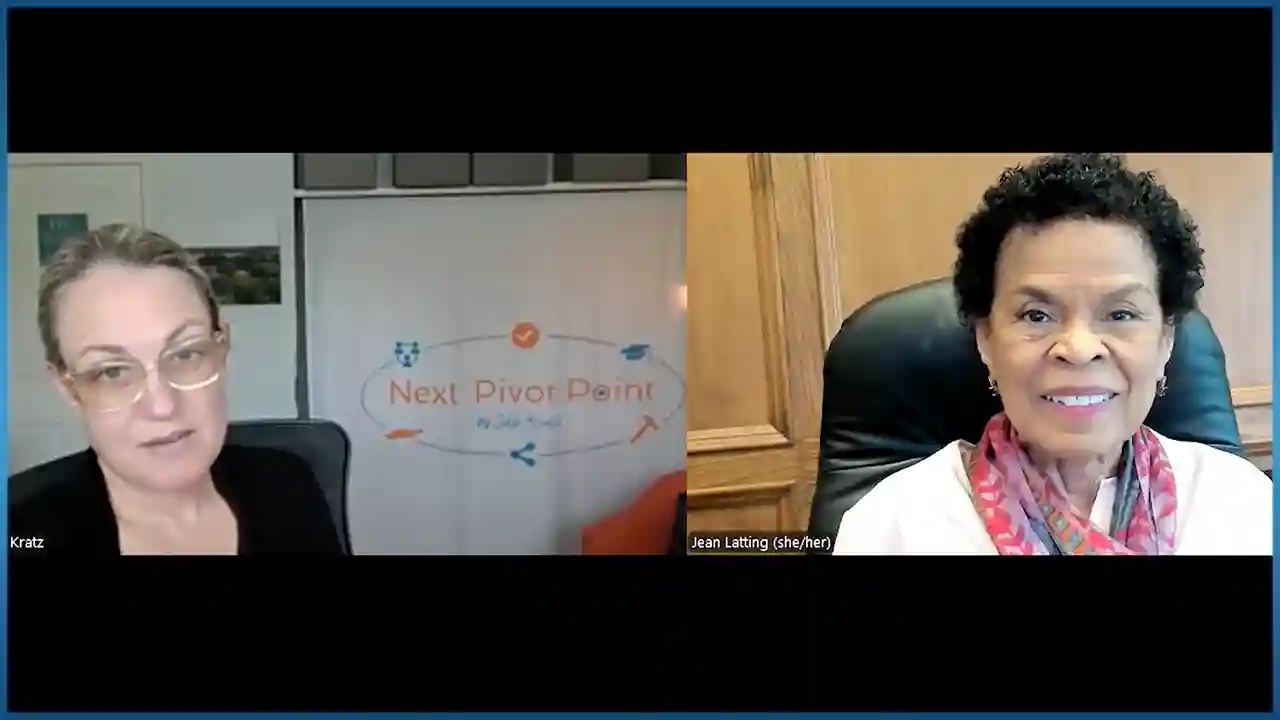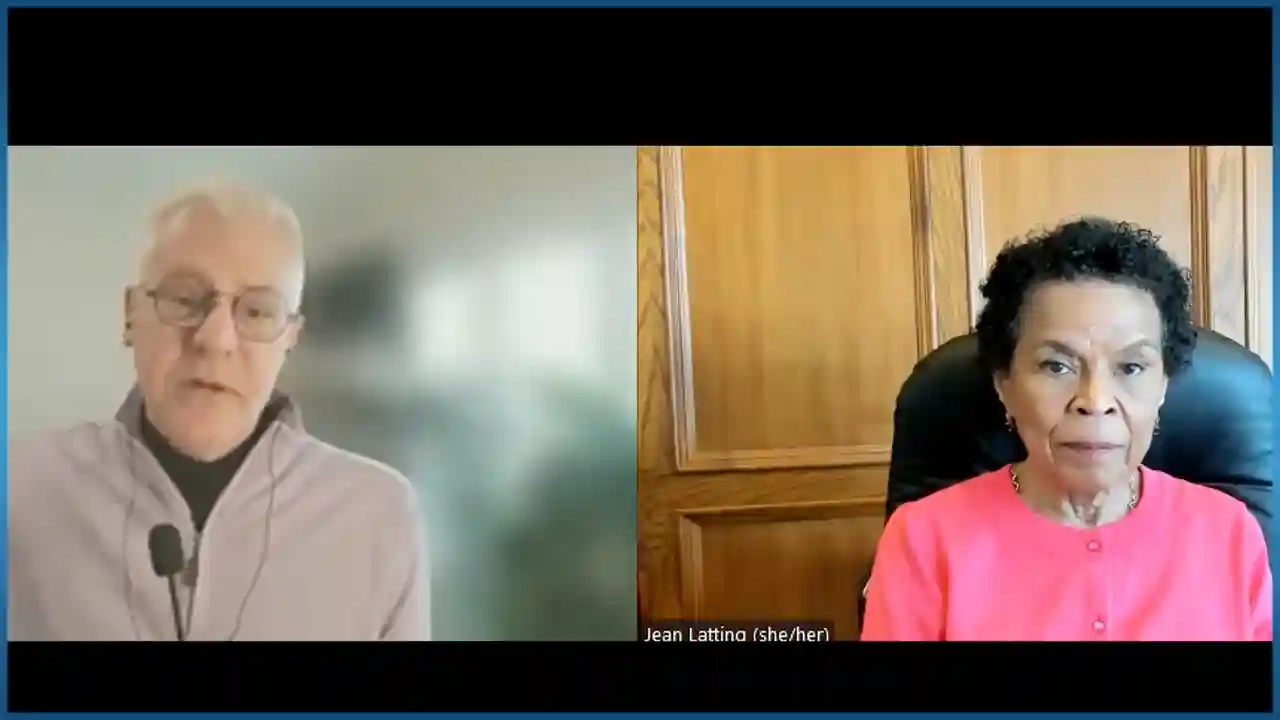


Amy Hageman
Amy Hageman shares what inspired her to speak honestly about race for 30 days on Facebook and why it was hard to talk about race.


Carole Marmell
What does it mean to develop an awareness of racism, starting to see things differently, interpret history differently, identify causes differently?


Jean Latting
Amy Porterfield's honest and difficult journey with her commitment to justice, her missteps and along the way, the model of a very public apology.


Jean Latting
Eliminating fear is not a desirable goal. Rather, the question is how to move ahead in spite of the fear.


Carole Marmell
Carole Marmell talks about participating in change by joining a small band of committed citizens to take down Confederate monuments in their hometown.


Jean Latting
How can one person make a difference? Macro action-oriented approaches: protesting, voting, writing to members of Congress are all viable options.


Jean Latting
How to refer to various ethnic/racial groups? This is my deep-dive on the many labels we use.


Jean Latting
This week’s blog is about the momentous change I have witnessed over the last two weeks in White people’s awareness of systemic racism.


Jean Latting
What is antiracism? Here's a curated list of reliable sources of information on race and racism in the workplace


Amy Hageman
Struggling with how to respond to White fragility & privilege? Amy Hageman’s post will help you understand what happens behind the scenes & what works.


Julie Kratz, a renowned expert in allyship, discusses strategies for fostering inclusive leadership and engaging those who are persuadable but uncertain.


Dr. Brad Johnson, a White male clinical psychologist who has spent most of his professional life learning and teaching how to encourage female talent.


Dr. Beth Kaplan, in her introduction to her new book Braving the Workplace: “I know what it's like to be unseen, unheard and unhappy."


Suneel Gupta will tell you that finding everyday dharma in the midst of a challenging life is not measured by outward success, nor by achievement, but by finding your essence.


Jean interviews Craig Dowden, author of A Time to Lead: Mastering Your Self… So You Can Master Your World and positive psychology coach.


Jean speaks with Malia Lazu about DEI in banking.


Jean interviews Minal Bopaiah, author of Equity: How to Design Organizations Where Everyone Thrives. She has much to say about the long and complicated path for DEI.


What do these two historically oppressed groups, Holocaust Museum Houston and the Kinsey Collection of African American Art, have in common?


Jean speaks with Dr. Myrtle Bell about the enduring value and strength of diversity.


Houston mourns Rev. William Lawson, founder and pastor emeritus of Wheeler Avenue Baptist Church.


Lisa Fain speaks with Jean about the growth potential for mentors and mentees when they truly speak with, listen to, and respect each other’s personhood.


Instead of being shamed for an error you made, you were supported in redressing the situation. How did it affect your sense of responsibility and ownership?


In this podcast, Hamza Khan and Jean Latting engage in an animated conversation about leadership, resilience, belonging, and burnout.


Jean addresses an issue in publishing her new book where she was confronted with the highly offensive misdeeds of one of her heroes. Read how she worked her way through it.


Amri Johnson has a few provocative things to say about the current state of efforts toward diversity, equity, and inclusion.


Jean sums up her history of optimism, the arc of social justice, and the deliberate steps one has to take to keep an eye on the prize.


Jean discusses transitional justice and the race class narrative: what works, what doesn’t, and how to stay the course.


Given our country’s long and difficult history with inclusiveness, Jean decided to sit down and write out her thoughts – during this year’s Black History Month.


How do you self-identify? Our identities affect our allyship with those who are being marginalized because of one or more of their identities.


Jean interviews Daniel Oestreich, co-author of two books on what to say to someone, especially people in the workplace, when you are afraid to say it.


How do you even begin to articulate a goal that lights you up, not to mention working toward it? Jean has some thoughts.


We envision a world of peace, mutual support, and mutual responsibility, including intolerance for hunger, climate action, responsible news outlets, and compassionate leadership.


Nina proposes susceptibility to harmful radiation and absorption of Vitamin D as the simple explanation for why people have different skin colors, a product of evolutionary adaptation.


Jean started listening to Steve Kerr, coach of the Golden State Warriors, honing in on his leadership skills. She was blown away by his insights.


Dr. Pratt learned how to follow the whisper of the spirit, work within and without the system, address racism and sexism head on, and promote impactful diversity initiatives.


Brain fog is a trap we fall into when our emotional reaction to a negative experience keeps us frozen. If we don’t have tools to keep us moving, we get stuck where it hurts the most.


In today’s world, leadership is not about telling people what to do. Rod McCowan trains leaders to consider moral principles when making decisions.


Studies show the benefits of affirming our value, yet we hesitate to share these affirmations with others.


Victor Varnado, born with albinism, chose to beat the odds stacked against him in life by using his comedic skills to pursue his dreams.


The Gross National Happiness Index exists, and it works in Bhutan as well as other countries. Mike writes of his upcoming visit to Bhutan to see this phenomenon in action.


Sherra Aguirre speaks with Jean about the leadership role she took on in her community to promote changing the typical African American diet.


In June of 2023, the Supreme Court ruled against the use of affirmative action in college admission.


Ilana Redstone says the Certainty Trap happens when we have moral principles we are 100% sure of and shut out any objections to the contrary.


We realized my brother was gay when his photo was on the cover of Time magazine titled “The Homosexual in America”.


Elizabeth Melendez Fisher Good was burned out and ended up with a mission to address sex trafficking.


Research shows that groups who put in the effort to welcome diversity and promote inclusiveness may have more conflicts but are also more productive and innovative.


Joanna Cea and Jess Rimington wrote Beloved Economies: Transforming How We Work, that invites us to reimagine work and reimagine capitalism.


The most successful people in any field know how to seek the expertise of other successful people in order to improve themselves and their performance.